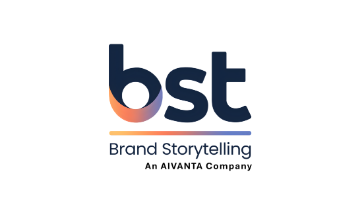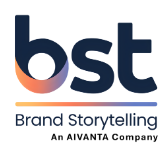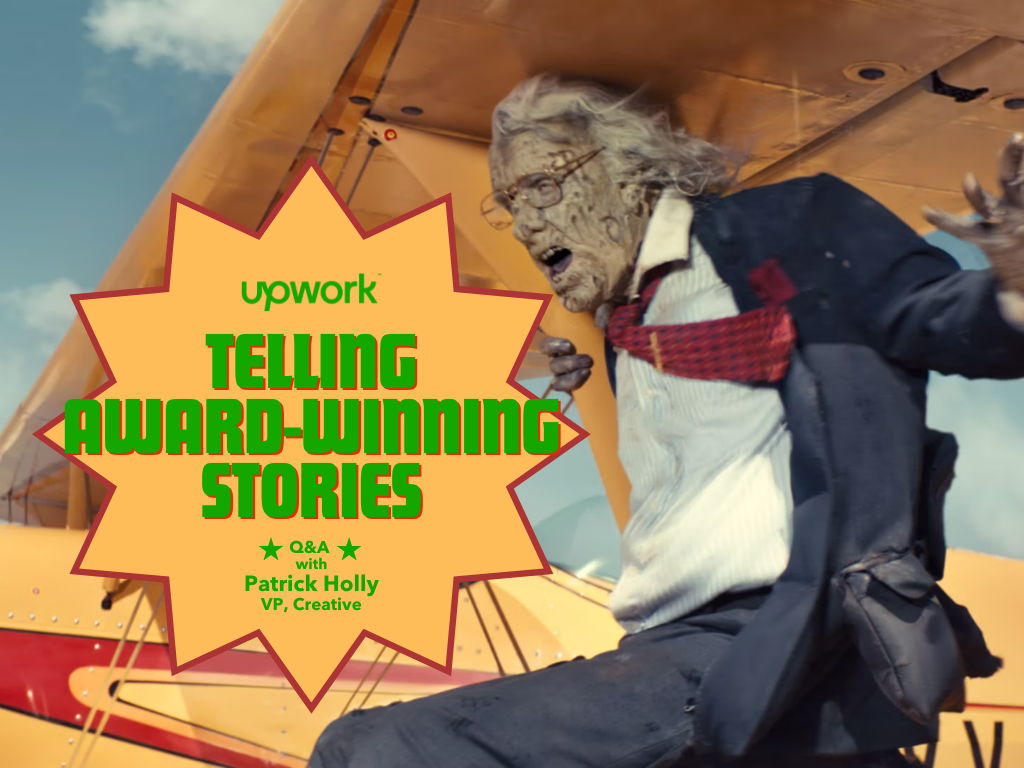Jordan P. Kelley, Content Director, BrandStorytelling

Want weekly exclusive brand storytelling content like this direct to your inbox? Subscribe to the Brand Storytelling Newsletter.
BrandStorytelling recently caught up with Patrick Holly, VP of Creative at the popular freelancing platform Upwork. Holly spearheaded Upwork’s multimedia campaign, “This is How We Work Now,” a creative and engaging short reinforcing the brand’s core belief that work should liberate rather than constrain. With a nod to the evolving work landscape, the campaign provocatively challenges outdated work paradigms, epitomized by a resurrected founder declaring the demise of traditional norms in a lively musical setting. As the piece unfolds, Upwork advocates for businesses to embrace contemporary perspectives on work, amplifying the voices of today’s workforce. Notably, the campaign’s accolades, including multiple Clio Awards, Webby recognitions, and Shots The Americas Awards nominations, underscore its impact and resonance within the industry. Here, Patrick Holly delves into inspiration for the award-winning campaign, the team effort that goes into great brand storytelling, and the challenges and opportunities that lie ahead for brand storytellers:

Could you walk us through the inspiration behind the “This is How We Work Now” campaign and how it aligns with Upwork’s brand ethos of freeing potential in work?
“This is How We Work Now” is all about challenging the traditional norms of work that have been around for centuries. When we first started talking about the campaign, the idea was to help people realize that concepts like working in an office from 9-5 with just two weeks of vacation were all just made up… so, why not make up something better?
Ultimately, we wanted to help people tap into their talent more effectively and free their potential, which is what Upwork’s all about.
How did you navigate the balance between creativity and effectiveness in delivering a message that challenges norms while still appealing to a wide audience?
We wanted a campaign that would turn the traditionally stuffy topic of work on its head while grabbing our audience’s attention in a way we had yet to see in our competitive space—this led us to comedy. First, we took the notion of the old ways of working being dead and made it literal with our dead CEO Jack. Second, we did it all in the most un-stuffy way possible: a musical. This creative execution mixed with a relatable call-to-arms to upend the old ways of work helped drive effectiveness and appeal to a wide audience.
The metrics show it too. Our brand awareness among large business decision-makers quadrupled, and perceptions of Upwork as a visionary for the future work rose by 45%. The campaign also led to a staggering 2,680% increase in social media mentions, solidifying Upwork’s pivotal role in evolving how we work.
Collaboration seems to be a central theme of the campaign. How did your team collaborate internally and possibly with external partners to bring this vision to life?
Collaboration played a crucial role in bringing this campaign to life. Our internal creative team, Workshop, partnered with Alto, our creative agency, to develop and execute the campaign, ensuring alignment with our brand ethos and goals. Our teams essentially became one during this process, and that close partnership—both in the creation of the campaign and the strategy that led to it—was the key to our success.
The campaign emphasizes the need for businesses to embrace new ways of working in a rapidly evolving world. How did your team ensure this message was effectively conveyed across different lengths of the campaign (90-, 30-, and 15-second spots)?
We strategically tailored the content for each spot. The 90-second film takes the form of a musical and allows for a deeper exploration of key themes underscoring Upwork’s call for change. It’s probably our catchiest, most fun for the formats.
The 30-second spots get a lot of the highlights in there, edited to especially emphasize the benefits of embracing new ways of working with the everpresent comedic moment thrown in there. Meanwhile, the :15s deliver the quickest, most direct message around the value of embracing a new normal so people not only understand the campaign, but the brand itself.
Winning multiple awards like the Clio and Webby Awards is a significant achievement. Can you share some insights into the key elements of the campaign that you believe resonated most with audiences and judges alike?
Most people experienced over a year of fully remote work starting in March 2020, and, in that time, proved their ability to perform their jobs just as effectively – if not more – from home. When this campaign first debuted in fall of 2022, return to office mandates had begun to trickle out, and people were feeling frustrated with the mandate to return to a system that time had proved unnecessary.
I think this campaign really resonated with audiences and judges alike because it said the quiet part out loud; it’s time to rethink the way we work. People want work to free their potential, not limit it, and the old ways of working are just that…old.
The campaign’s success is evident not only in its creative execution but also in its ability to spark conversations about the future of work. How do you measure the impact of such a campaign beyond traditional metrics like awards and views?
I think our hope is that each view, each engagement, ladders up to a conversation in workplaces across and beyond the United States around what the future of work looks like.
While Gen Z and Millennials have shown a strong affinity for hybrid and remote work models, older generations remain more skeptical. My hope – and our hope at Upwork – is that this campaign leads to lasting organizational change by helping folks across age brackets initiate and listen to conversations around the value of different ways of working.
Looking ahead, what are some challenges and opportunities you foresee in continuing to innovate and redefine how brands reach audiences through creative initiatives that go beyond the traditional 30-second spot?
I actually just participated in a panel at Youth Marketing Summit in March that addressed some of these themes through the prism of experiential. In discussing how to reach Gen Z, my panelists and I underscored the importance of showing value. If you’re a brand popping up at a music festival, enhance concertgoers’ experiences by offering them flash tattoos; don’t just hand out branded t-shirts and water bottles.
That’s obviously a particular example, but, when thinking about marketing and advertising as a whole, I think we as an industry really need to think about the human impact of creative initiatives and how we can, simply put, make people’s lives better through efforts beyond the traditional 30-second spot.
About Patrick Holly:
Patrick is a multidisciplinary creative whose career has run the gamut from agencies like R/GA and AKQA, to brands like Apple and Uber, to building a content platform with Steph Curry. He currently serves as Upwork’s VP of Creative leading a team of writers, art directors, designers, strategists, project managers, and producers who are changing the way the world thinks about work. His team’s work has garnered nods from Cannes, ADC, Clios, and more. Prior to joining Upwork, Patrick was the brand director at Harley Davidson, overseeing content, PR, social, and brand partnerships.



Leave a Comment